Training IT specialists in Serbia
“Tell me, comrade lieutenant, is it not strange for you here in Solovts?”
The lieutenant was already looking at some papers.
“I’ve been here a long time,” he said absently. - I'm used to.
 Good day, habrasoobschestvo. Let me share with you my learning experience in a faraway country.
Good day, habrasoobschestvo. Let me share with you my learning experience in a faraway country.I came to Serbia for personal reasons, at first it was not my plan to remain here. However, this was desirable, and when the given faculty turned up, the decision was unequivocal. Yes, nostalgia sometimes knocks on the window
about country
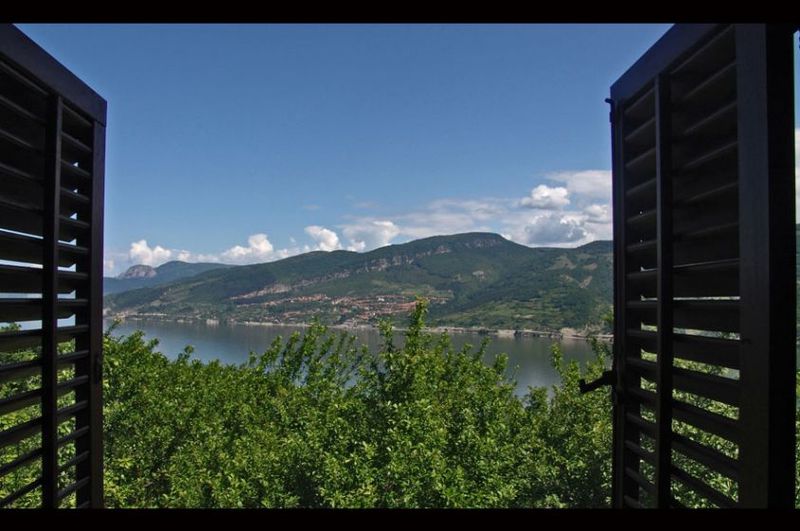
Despite the riots on the border with Kosovo, Serbia is a very quiet, peaceful and calm place. Not always (victories / defeats of favorite football clubs, homophobic crusades of the ordinary population against gay parades), but for the most part. For example, from the criminal chronicles of the day: the bus was hijacked, the hijacker was found at home, the bus in the park nearby; Mrs. Lukic forgot to turn off the iron, the fire was put out by the neighbors; according to the results of a police and drunken company clash, 10 people were arrested, one was hospitalized with a knife wound to the buttock.
')
Serbia is quite a popular place among European tourists. Partly because life does not stop here after 6 pm, the fun goes until dawn. Also, there are very low prices. The climate is mild, in cold winters the temperature does not fall below -10 degrees. Snow falls around the end of December. Cafe, restaurants, buloshny and other places where you can eat very, very, very much. Serbs love to eat delicious, love here.
They love the Serbs and Russians, their fellow Slavs. However, sincere love is found in elderly people or extremely rare. The dream among young people is strong to go to the States and become rich and famous, the attitude towards Russia is unstable. But, nevertheless, on the whole, the attitude towards the Russians is warm, although, after the policy of the Russian Federation in relation to the conflict between NATO and Yugoslavia, the Russians were unwelcome guests here. Despite the fact that our troops were still there and did their bit. But we will not delve into this topic.
About faculty
The faculty is private, founded by Dragan Domazet, who until 2004 was the Minister of Science, Technology and Development of Serbia. Frustrated by the educational process in the state. Institutions, he decided to make his university, with modern technology and open views.
So it happened.
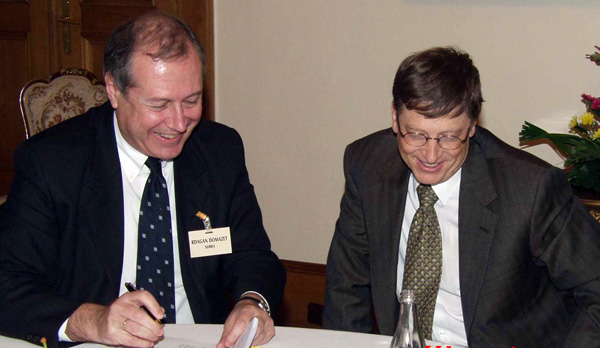
Dean Dragan Domazet signs a cooperation agreement with Uncle Billy.
The main educational building, where IT specialists, IT managers, advertisers and digital designers are currently studying, is located on the banks of the Danube River. Once it was a sports center founded by Joseph Tito in the best years of Yugoslavia. Sports sections remained here, tennis tournaments, in particular, take place nearby, but part of the premises belongs to our faculty. Fresh wind, the smell of the river, bike lanes have a positive effect on young minds:

There is a cafeteria at the faculty, where you can drink coffee / tea / cocolush and eat a sandwich / chocolate / soup from a bag. The cafeteria is paid, as well as training. Predicting questions about the cost: 3000 European raccoons for full-time education and 1500 for online training in order to get a bachelor's degree. Master and doctoral studies are now only in absentia (read online education) and will cost 2000.
Training rooms are divided into lecture and computer. All computer classes are equipped with Win7 + Ubuntu machines, except for one thing - designers are enjoying the creations of Mr. Jobs there.
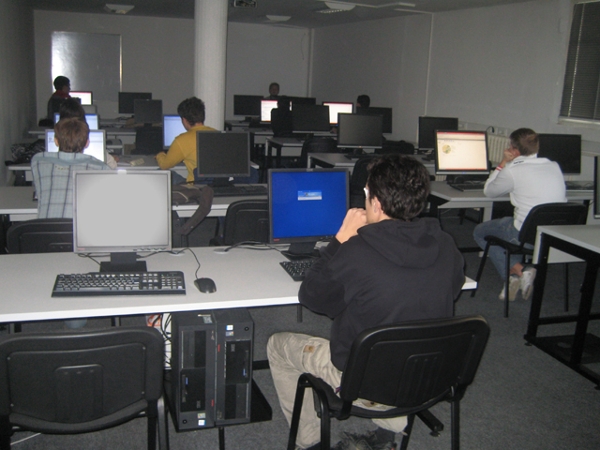
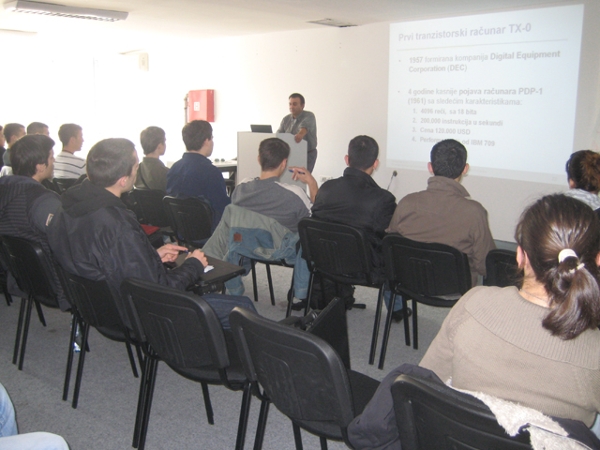
About curricula
Undergraduate IT students consists of three years of study, 6 semesters. Graduate - 2 years, doctorate - another 3. In each semester - 5 subjects. Some of the items are common for IT people and IT managers. The first three semesters are English in-depth and English professional. The first four semesters are Linal, Matan, Discrete Mathematics and Statistics. There is no physics, it remained at the State Faculty of Electrical Engineering, which also prepares programmers. They teach Fortran, BASIC ... What our dean taught when Tito was
We have the same content of specialized items is updated by 30% every year, in order to be ahead of the rest. And these are not just words, it is really happening. What is not happy negligent students, write off the older can not everything.
The main programming language is Java. We also learn assembler, html, js, php. In the third year of study, you can choose the additional subject of C / C ++ or C #. But here it is worth telling about the choice of the third year of study.
When students grow up, they have a difficult choice: go straight to Software engineering, go to the right, go to Information Systems, or go left, to Game Development. This year, the “Networks and Communications” compartment appeared. This year, as in the past, SE is the leader in the number of students, IS is in second place, and
Education via the Internet (as well as the usual, all lectures in the form of presentations and pdf, as well as the content of practical exercises and homework, are available to traditional students) at this time is using the b-gorgeous Oracle iLearning system, forgotten somewhere in 2003 year Fortunately, now we are switching to Sakai LMS and life is getting better.
About subjects
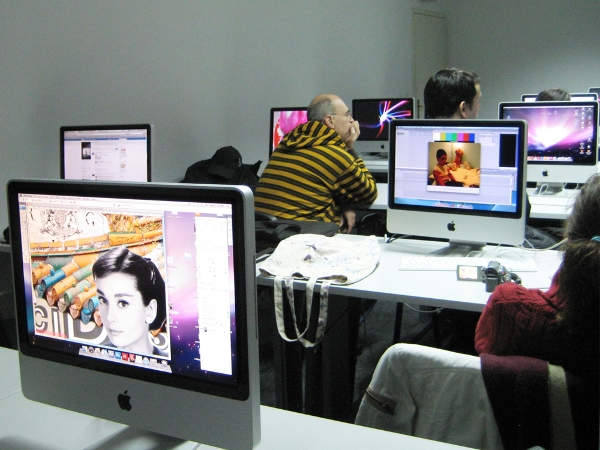
On each subject there is a professor who conducts lectures, and an assistant who practices, accepts / checks homework, etc. Accordingly, each item is divided into two parts. As a rule, the practice goes right after the lectures. But, in the same English, practice is mixed with lectures. Also sometimes a professor can be an assistant. At certain hours, any teacher is available on Skype for advice. Questions can be left on the faculty forum.
The faculty has a point system. To close an item, you need to score more than 51 points, and the exam will need to score more points for the exam, otherwise the exam will not count. But first things first.
- 15 points are awarded for weekly tests. The test can bring from 0.1 to 1 point. On some subjects, tests only happen once every three weeks.
- 22.5 points - for homework. They can also be 5 or 15. Deadline - one week, after which the assessment falls by half.
- 25 points - the project. Deadline - 10 days before the exam. In mathematics, instead of the project - colokviums.
- 7.5 points - activity in lectures and practice.
- 30 points - the exam. Mathematics is written, English is written, some of the subjects are on computers in the form of a test, some are on computers in the form of a task or several.
Failure to attend lectures or practice is punishable by -0.5 points. One missed day is -1 point. It is already the third year that we have only 4 working days, two subjects are going on in one day. When the day off is Wednesday is very good. But when you have three days off, it's overly relaxing. Note from personal (and not only) experience.
About teachers
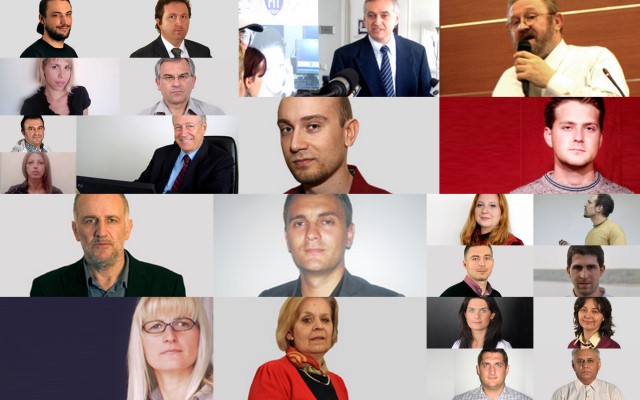
All professors (not assistants) are doctors of science. Some of them were trained and internships at various universities in Europe and America. Work at the faculty and foreigners. Mat. science taught Eberhard Malkowski, a wonderful man, a wonderful professor. German teaching was in English. I was always happy to help and explain. Alas, alas, other students did not appreciate what he was doing for them and it came to the point that he left our faculty. Various manifestations of disrespect, entrance without knocking in the middle of a lecture, wandering around the office ... Complaints about teaching in a language that they do not understand (despite the 3 semesters of the English language). At the same time, practical lessons were held with an assistant, who explained and showed everything in his native Serbian. The few who ever came. Alas, people are evil and cruel. And the faculty lost a beautiful person. But let's not talk about sad things.
We have one professor, the Croat, a merry fellow and a joker, a connoisseur of anecdotes and operating systems. One of the assistants is Macedonian, speaks Serbian, but speaks with a pleasant soft accent. Like me, by the way. Although it is often invisible, I become local. And yes, there will certainly be questions about the language. The language is fairly easy, partly intuitive to the Russian person. Although the Serbian language is very ... a lot of non-Slavic words, borrowed for some reason from European languages. Tasche - bag in German. Tashnya - bag in Serbian. And such examples are more than enough. But you can master it quickly. Although I personally never taught him - it was just that he was often heard, and as a result I began to speak. And the daily doses of Serbian at the faculty have strengthened the skill.
But back to the teachers. They are friendly and sweet. Perhaps except for one assistant who left us in favor of work. Good luck to him. As I said, teachers are available on Skype, as well as in his free time at the faculty. Always help, always prompt. The motto of the faculty: "The student is the center of attention!" And it is. Professors do not come to "take and dump", they come to "teach and educate." Yes, yes, just like in school. By the way, the number of students also resembles a school. There are about 50 full-time IT specialists on the course. That is about one and a half to two hundred for three courses. Online students more.
The formal appeal between students and teachers is a "colleague."
About students

From far abroad I am alone in the faculty. But we have a whole galaxy of comrades from all the Balkan countries: Serbia, Montenegro, Bosnia, Croatia, Macedonia, etc. There are no Albanians, you understand, interethnic (and religious) hostility.
Students are different - someone likes to study, someone is not very. All Montenegrins are lazy, this is their nat. feature
But women among modern Serbian IT people is a myth. Male society, the heavy legacy of the patriarchal past.
About parting
Here we come to the end of the story, I hope he did not tire you too much.
I am happy to answer any questions about the country, faculty, etc., if you have them.
Good luck!
“And somewhere far away, somewhere far away are mushroom rains ...”
Source: https://habr.com/ru/post/130824/
All Articles